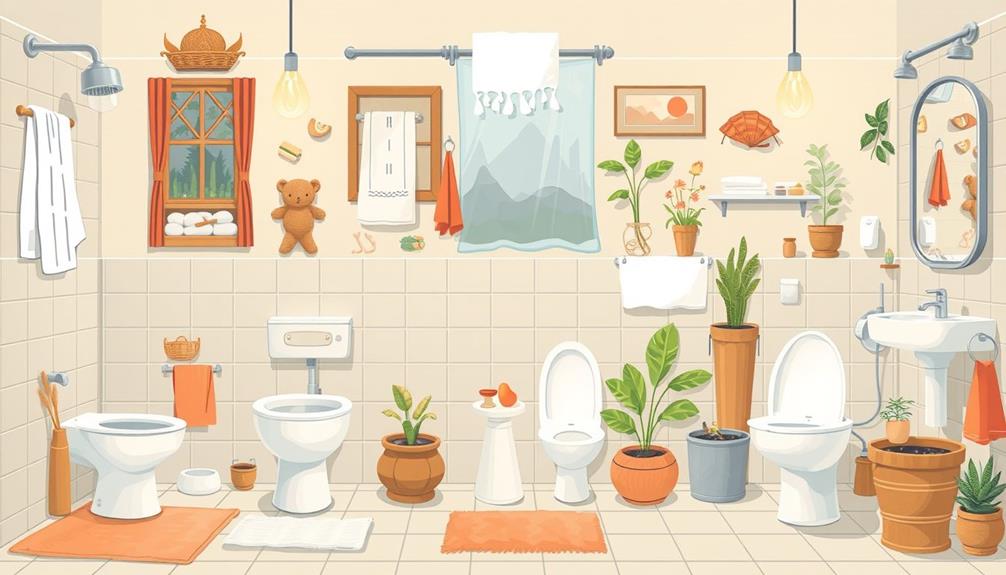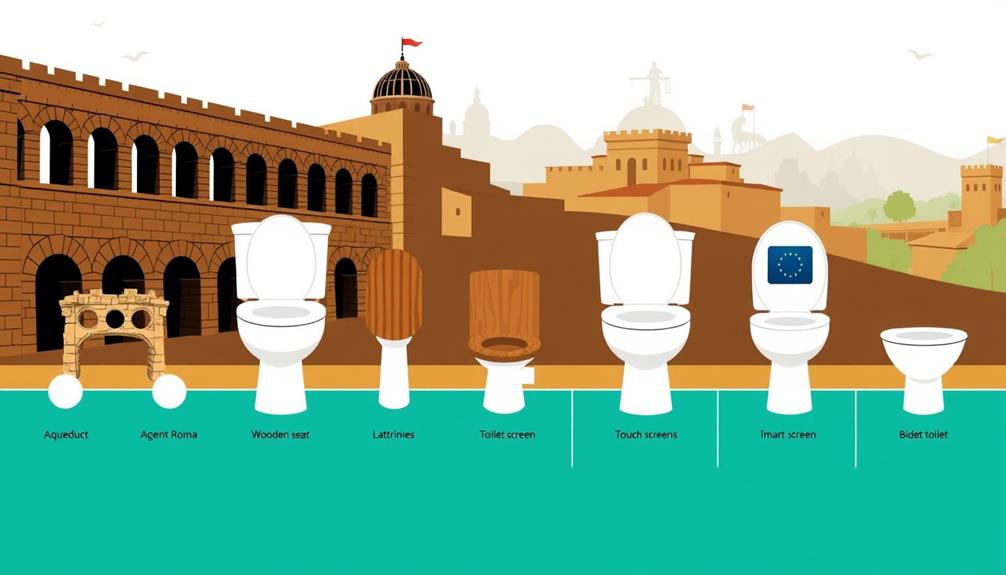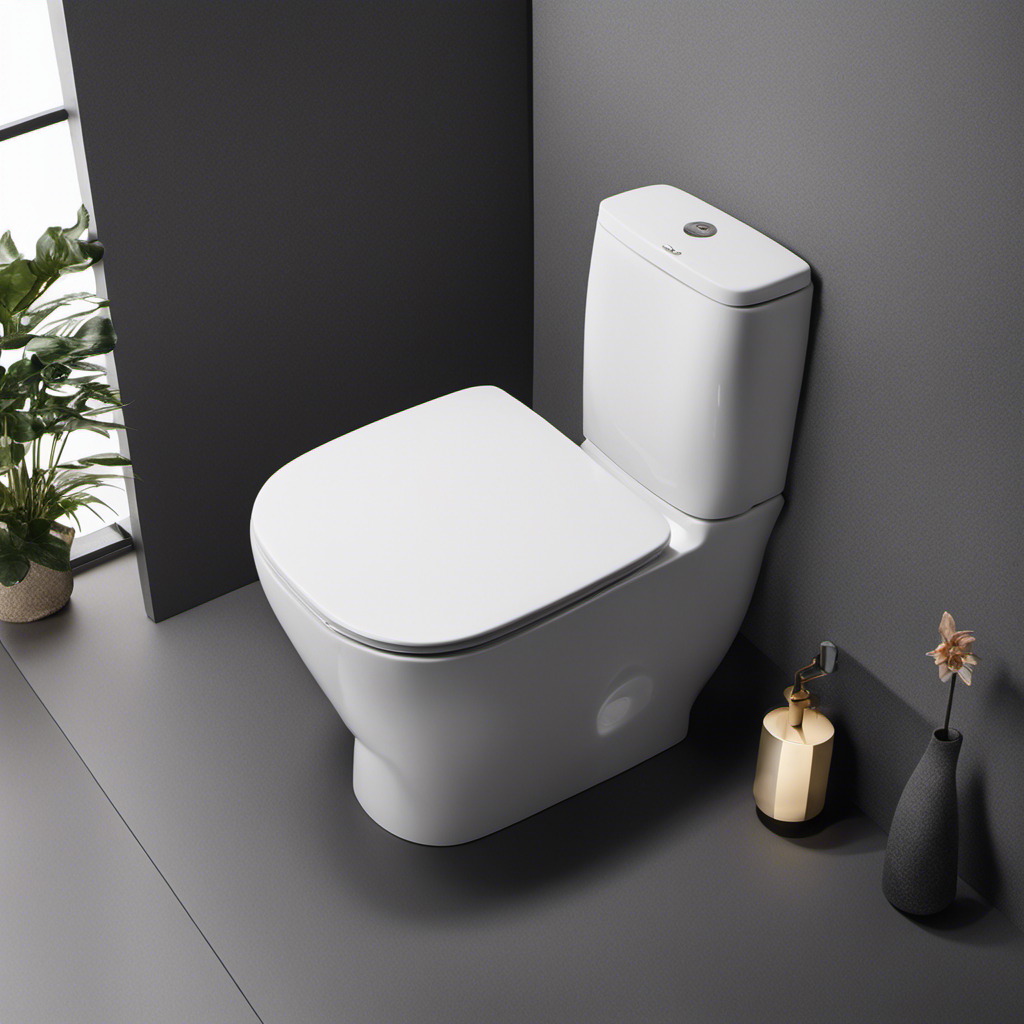When traveling, knowing toilet paper etiquette can save you from awkward situations. In Greece and Turkey, don't flush the paper; use bins instead. In China and South Korea, many public restrooms lack toilet paper, so carrying your own is wise. Squat toilets are common in Asia, requiring a bit more agility. Meanwhile, bidets are favored in Italy and Japan for better hygiene. Understanding these customs enhances your experience and respects local practices. Stick around to uncover more about restroom practices and tips that can make your travels even smoother.
Key Takeaways
- In Greece and Turkey, dispose of used toilet paper in bins rather than flushing to avoid plumbing issues.
- Many public restrooms in China and South Korea do not provide toilet paper; always carry your own supplies.
- Squat toilets are common in Asia; practice cleanliness and secure belongings while using them.
- Bidets are preferred in Italy and Japan, offering superior hygiene and reducing toilet paper reliance.
- Tipping restroom attendants is customary in Europe, typically ranging from $0.50 to $1 for their services.
Restroom Tipping Practices in Europe
When traveling through Europe, understanding restroom tipping practices can save you from awkward situations. While many public restrooms are now free, some cities still have pay facilities, like Amsterdam.
In attended restrooms, tipping's customary, usually between $0.50 and $1. This shows appreciation for the attendants who keep the facilities clean and stocked. It can be helpful to know that similar to how you'd evaluate cleaning service providers, observing local customs can enhance your experience.
Be aware that some attendants might place large bills in tip jars, which can confuse tourists about the appropriate amount to tip. It's important to keep an eye on the local tipping culture to avoid misunderstandings.
The move towards free public restrooms reflects a growing emphasis on inclusivity in urban spaces, making it easier for everyone to access necessary facilities.
However, this doesn't eliminate the need for tips in places with attendants, as their services maintain the quality of these restrooms.
Squat Toilets in Asia

Restroom experiences can vary considerably from one region to another, especially when it comes to toilet designs. In many Asian countries, you'll encounter squat toilets, which are in-ground fixtures designed for users to squat over. These toilets promote a more natural posture, often deemed healthier for bodily functions.
In addition, it's important to be aware of hydration is vital when preparing for any travel, as staying hydrated can aid in a more comfortable experience overall.
When using a squat toilet, it's important to secure your pockets to prevent accidents, as balancing can be tricky for first-timers. Splashback can also happen, so be cautious to maintain cleanliness in public bathrooms.
You might find that toilet paper isn't always available in these facilities. Instead, many places encourage alternative cleaning methods, such as using water or bidets for personal hygiene.
Understanding toilet etiquette in these settings is vital; it's not just about using the toilet, but also about how to clean yourself afterward respectfully.
Toilet Paper Disposal Guidelines

When traveling, you need to know the toilet paper disposal practices for each country you visit.
In places like Turkey and Greece, tossing used paper in bins is the norm to prevent serious plumbing issues. This is especially important as financial considerations in divorce can arise from unexpected expenses related to plumbing repairs.
Ignoring these guidelines can lead to inconvenient blockages, so it's crucial to follow local etiquette.
Disposal Practices by Country
Understanding the nuances of toilet paper disposal practices around the world can save you from potential embarrassment while traveling. In countries like Turkey, Greece, China, and Egypt, flushing toilet paper is discouraged due to narrow plumbing systems. Instead, you'll find designated bins for disposal, so be certain to keep an eye out for signage in public toilets indicating the proper methods.
Additionally, being aware of local customs regarding personal hygiene can enhance your travel experience, as maintaining cleanliness is essential in many cultures, which is similar to the importance of mental health support in cognitive health.
In many restrooms in these regions, you might notice the absence of toilet paper entirely, which means you'll need to carry your own supplies. Familiarizing yourself with these local customs before your trip can save you from awkward situations.
In contrast, some places utilize high-tech toilets equipped with bidets, offering an alternative cleaning method that promotes hygiene without relying on paper products.
In rural areas of South America, similar practices apply where proper disposal is essential to prevent blockages. By understanding these disposal practices, you guarantee compliance with local etiquette and maintain a respectful attitude towards the cultures you encounter.
Clogging Risks Explained
Clogging risks are a serious concern in many parts of the world, especially where plumbing systems are outdated or inadequate. In countries like Turkey, Greece, and Egypt, flushing toilet paper can lead to significant plumbing issues. Narrow pipes and ineffective waste systems can cause backflows, resulting in costly repairs and unpleasant situations.
Additionally, it's important to be aware of cat health and nutrition since similar caution is necessary when introducing new foods to pets, as it can lead to digestive issues if not monitored properly.
To avoid these problems, you should always pay attention to local customs regarding toilet paper disposal. In many of these regions, it's customary to dispose of toilet paper in bins rather than flushing. Look for signs in public restrooms that clearly indicate the proper disposal method to avoid confusion and maintain cleanliness.
Using bidets is another effective alternative. They promote better hygiene and help reduce waste, making them a popular choice in areas with strict disposal rules.
If you're traveling, respecting local practices won't only keep you from embarrassment but also contribute to a more pleasant restroom experience for everyone. Always remember, when in doubt, ask or observe how locals dispose of toilet paper to ascertain you're following the right guidelines.
Bringing Toilet Paper in Certain Countries

Travelers often find themselves in situations where bringing their own toilet paper is essential, especially in countries like China and South Korea.
In China, many public restrooms don't provide toilet paper due to theft issues, leading to frequent shortages. To avoid discomfort, it's smart to carry tissues or small packs of toilet paper with you. This guarantees you're prepared for any restroom visit, similar to how financial diversification can mitigate risks during travel.
Similarly, in South Korea, it's customary for travelers to carry their own toilet paper. While some facilities may offer it, not all do, making it a good idea to have your personal supply. This practice can save you from an inconvenient situation and enhance your overall travel experience.
With the implementation of facial recognition technology in some Chinese public toilets, the focus on regulating toilet paper access becomes even clearer. It highlights the necessity of being self-sufficient.
Bidet Usage Worldwide

When you travel to countries like Italy or Japan, you might notice that bidets are more popular than toilet paper.
These fixtures not only offer a more thorough cleaning but also come with health benefits, making them a preferred choice for many. Additionally, some studies suggest that using bidets can lead to improved hygiene and reduced irritation compared to traditional methods, as noted in breast cancer symptoms.
Understanding how to use a bidet can greatly enhance your comfort and hygiene while abroad.
Global Bidet Popularity Trends
Across the globe, bidets are becoming increasingly popular as more people recognize their benefits for personal hygiene and environmental sustainability. Originally from France, bidets are widely embraced in countries like Italy, Japan, and Argentina, where they often replace toilet paper. As awareness of hygiene and eco-friendly practices grows, especially in the United States, the bidet market is experiencing a significant upswing.
Here's a quick look at bidet usage trends worldwide:
| Country | Bidet Popularity |
|---|---|
| Italy | High |
| Japan | Very High |
| United States | Growing |
| Argentina | High |
Bidets come in various forms, such as standalone fixtures or integrated toilet seats, catering to diverse user preferences. Their increasing prevalence reflects a global shift towards cleaning methods that prioritize hygiene while reducing toilet paper waste. As you consider your bathroom options, you might find that opting for a bidet not only enhances your personal hygiene but also contributes positively to the environment. This growing trend showcases how bidets are redefining bathroom culture and hygiene practices around the world.
Health Benefits of Bidets
Bidets' growing popularity isn't just about comfort; they also offer significant health benefits that can enhance your hygiene routine. By using water for cleansing, bidets provide a gentler alternative to toilet paper, which can be harsh on sensitive areas.
Studies show that bidet usage can reduce the risk of urinary tract infections and hemorrhoids, making them a wise choice for maintaining intimate hygiene. Additionally, adopting a more sustainable hygiene routine resonates with the increasing consumer awareness surrounding vegan products, reflecting a shift towards more ethical living choices.
In countries like Italy, Japan, and Argentina, where bidets are commonplace, many users report feeling cleaner and more comfortable compared to using toilet paper. This increased cleanliness not only promotes personal health but also aligns with cultural beliefs surrounding hygiene.
Moreover, bidets contribute to environmental sustainability. By decreasing your reliance on toilet paper, you help reduce deforestation and the excessive water usage involved in its production.
As more people recognize these benefits, the use of bidets is likely to expand beyond traditional markets, potentially reshaping hygiene practices worldwide. So, if you're seeking a healthier, more sustainable alternative to toilet paper, consider making the switch to a bidet—it might just change your bathroom experience for the better.
Global Bathroom Practices

Understanding global bathroom practices is essential for any traveler, as these customs can vary greatly from one country to another. Ignoring local etiquette, especially regarding toilet paper and disposal methods, can lead to uncomfortable situations.
For instance, being aware of the importance of investment security in precious metals can parallel the necessity of understanding local customs, as both require attention to detail to avoid pitfalls.
Here are some key points to keep in mind:
- In countries like Greece and Turkey, avoid flushing toilet paper due to narrow plumbing systems.
- Many Asian nations, including India and Thailand, prefer squat toilets, which may require you to alter your technique.
- In China and South Korea, it's wise to carry your own toilet paper, as public restrooms often lack supplies due to theft.
- Countries like Italy and Japan widely use bidets, offering a hygienic alternative to toilet paper.
Being aware of these cultural differences can enhance your travel experience.
For instance, knowing when to use bins instead of flushing toilet paper can prevent awkward moments. Embracing local bathroom etiquette not only shows respect but also helps you navigate different environments with ease.
Whether you're in a bustling city or a remote village, adapting to these practices guarantees a smoother journey.
The Squat Toilet Experience

While many travelers are accustomed to seated toilets, stepping into the world of squat toilets can feel like a whole new experience. Common in many Asian countries, such as India and Thailand, these in-ground toilets require you to balance while squatting. This different posture can challenge your focus and comfort, especially if it's your first time.
Understanding toilet anatomy aids in effectively using these facilities can help ease the shift. As you navigate using the toilet, keep in mind that cleanliness may vary. You might find water on the floor, which can be confusing regarding the toilet's intended use. It's also essential to remember that toilet paper may not always be available. In these cases, you'll need to embrace alternative cleaning methods, often using water to maintain hygiene.
Familiarizing yourself with squat toilet etiquette can greatly enhance your experience. For instance, aim to keep your feet flat on the ground and your body centered. It's also courteous to leave the toilet area clean for the next user.
With practice and a bit of patience, you'll find that using a squat toilet can be a comfortable and efficient option while traveling.
Staying Dry After Use

Staying dry after using alternative cleaning methods can be a bit of a challenge, especially in regions where water is the primary hygiene tool.
Many travelers find themselves puzzled about how to stay dry after using hoses, buckets, or bidets. Without the comfort of toilet paper, adapting to local practices is essential.
Here are a few tips to help you navigate this aspect of personal hygiene:
- Positioning: When using a bidet, verify you're positioned correctly to minimize splashes.
- Towels or Cloths: In some cultures, a designated towel or cloth is used for drying. Make sure it's clean and designated for this purpose.
- Air Drying: If possible, allow some time for air drying. It's a common practice in many regions.
- Portable Options: Consider carrying a small, travel-sized towel or absorbent cloth for convenience.
The Case for Toilet Paper

Toilet paper offers a sense of comfort and cleanliness that many people swear by, especially in Western cultures. You probably appreciate the convenience and perceived hygiene it provides, as frequent marketing reinforces the idea that toilet paper is essential for personal cleanliness.
In countries like the U.S., Canada, and much of Europe, toilet paper has become the norm, shaping public opinion about hygiene practices.
However, cultural differences play a significant role in how people view cleaning methods. In regions like the Middle East and India, for example, toilet paper can be considered taboo, leading to the use of alternative cleaning methods.
This divergence raises questions about cleanliness and effectiveness, as some argue that water-based methods are superior for hygiene.
Ultimately, it boils down to personal comfort. While you might find toilet paper indispensable, others may feel just as clean using different methods.
Understanding these cultural perspectives can help bridge the gap in perceptions of hygiene, allowing for a more inclusive conversation about what it means to be clean in various parts of the world.
Frequently Asked Questions
Which European Countries Do Not Use Toilet Paper?
You might find that some European countries, like Italy in rural areas, often lack toilet paper in older establishments. In Spain, certain public restrooms may not provide it, so always be prepared when traveling.
What Part of the World Doesn't Use Toilet Paper?
Ever wondered how different your routine could be? In parts of the Middle East and Asia, folks often opt for water-based cleaning methods instead of toilet paper, embracing alternative hygiene practices that might surprise you.
What Countries Do Not Flush Toilet Paper?
In countries like Greece, Turkey, and Egypt, you won't flush toilet paper due to plumbing issues. Instead, you'll find bins for disposal. Always check local customs to avoid any bathroom mishaps while traveling.
Are You Supposed to Flush Toilet Paper in Europe?
When you travel through Europe, think of the plumbing as a delicate dance. Generally, you can flush toilet paper, but keep an eye out for local signs; practices can vary, especially in older facilities.
Conclusion
Now that you've explored toilet paper etiquette around the world, you might wonder if there's a universal right way to handle bathroom visits. The truth is, each culture has its own practices shaped by history and necessity. Embracing these differences not only helps you navigate restrooms more gracefully but also enriches your travel experience. So, the next time you find yourself in an unfamiliar bathroom, remember: a little knowledge goes a long way in keeping you comfortable and respectful.










